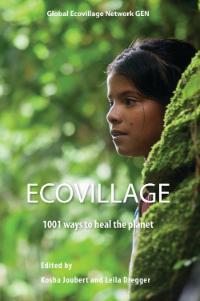ECOVILLAGE - 1001 ways to heal the planet
Edited by Kosha Joubert, Leila Dregger, Global Ecovillage Network, GEN, Scotland, 2015

During the GEN 20+Summit in Findhorn Kosha Joubert and Leila Dregger presented the new GEN book about ecovillages worldwide, which they had written with the help of many longterm ecovillage members who contributed their very personal stories, thoughts, experiences, adventures, failures, learnings and successes. The book can now be ordered. Everybody interested in social and ecological change and building a global alternative should know this source of experience and wisdom.
This book introduces a selection of ecovillage projects from all over the world. The editors have aimed to give a taste of their richness and diversity with examples from Europe, Latin America, Asia, Africa and North America. Most of the chapters are based on interviews with founders or long-standing members of ecovillage communities; while a few chapters are about regional or national networks of ecovillage transition. The book sets out both to honour successes, but also to learn from difficulties and failure.
As well as serving as an inspiration to its readers, the book is also intended as a learning resource. At the end of each chapter, the editors have given a few keywords, listing some of the best approaches used by each ecovillage, for example, in developing a water treatment facility, building a straw bale house or supporting groups of people in their endeavours. You can find out more about these solutions in the GEN Solution Library - there are links in the book.
“Ecovillages have long served a vital function as the laboratories of a resilient future, where solutions are tested, tweaked, adjusted. Sometimes they work, sometimes they don’t, but it’s in the “what if?” spirit that their genius lies. Kosha Joubert and Leila Dregger’s new book celebrates the remarkable diversity to be found in the eco-village movement, and their insights resonate far beyond the ecovillages themselves”. - Rob Hopkins, Founder of the Transition Network
“Your heart will soar as you revel in this treasure trove of evidence that a new and better future is not only possible but happening NOW all over the world where ordinary people have taken matters into their own hands, building vibrant, loving, sustainable communities… even national governments are beginning to take them seriously enough to support their growth… You will be filled with new inspiration and implementable ideas, so spread the book itself as far and wide as you can!”
Elisabet Sahtouris, PhD, evolution biologist & futurist, author of Gaia’s Dance
Nowadays, ecovillages are widely accepted as living and learning centers, as lighthouses for social and ecological sustainability in their regions, as alternative to the destructive mainstream lifestyle that has brought the planet to the edge of extinction. However, 20 or 30 years ago, nobody knew the word ecovillage. Many intentional communities that existed were regarded as dropout groups, hippie oases and they were, here and there, just beginning to cooperate with other sectors of society such as politics, economy or media. It took some time before the world acknowledged the many solutions that the pioneer generation has been testing in their remote places. It also took a while before the communities, with their different approaches to an alternative lifestyle, started to regard themselves as a global movement - diverse, with different experiences, but with the same aim and principles.
It needed people in the projects who were ready to look at the bigger, the global, picture and not only their own philosophies, situations and challenges. The communities had to come together and start to form community amongst themselves: to share, to learn from each other, even correct each other and form a common platform.
The concept of ecovillages first arose in the late 1980s, with the intention of offering an alternative to a culture of consumerism and exploitation. Combining a supportive and high-quality social and cultural environment with a low-impact way of life, they have become precious playgrounds in which groups of committed people can experiment to find solutions for some of the challenges we face globally. Ecovillages are now part of a worldwide movement for social and environmental justice and have become regional and national beacons of inspiration for the social, cultural, ecological and economic revival of both rural and urban areas.
